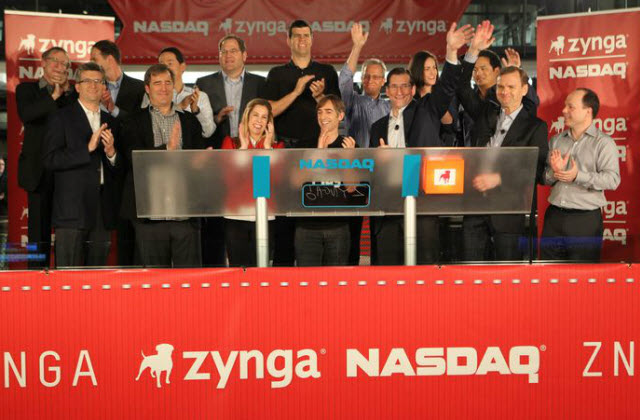Zynga’s stock sank 5 percent yesterday, from $10 to $9.50, on its first day of trading. Some investors might feel like the stock will bounce back on Monday or in the weeks ahead. But at least one analyst is staying bearish.
New York-based PrivCo, a private market research firm headed by Sam Hamadeh, has been prophetic in its skepticism about Zynga so far. Early this summer, after Zynga filed its papers to go public, PrviCo said that Zynga’s rumored valuation of $25 billion was too high by a factor of four. And last month, PrivCo estimated that Zynga would go out at $10 a share — exactly the price the company eventually settled on.
Now, PrivCo said the Zynga IPO was “busted” because Zynga made a number of tactical errors.
Zynga did not restrict its float, or percentage of shares offered, to under 10 percent as Groupon and LinkedIn did. By doing so, those companies limited the number of shares available and created a lot of demand for the small amount of stock offered. Zynga offered 14 percent of its shares outstanding. Zynga tried to raise $1 billion regardless of price. As pricing was cut, Zynga increased its shares offered, hurting its IPO price.
The size of the underwriter’s overallotment option (or the “green shoe” in Wall Street parlance) was a full 15 percent of the IPO shares, or the 100 million shares offered. These are shares the underwriter may purchase in the first days after the trading. These shares could be purchased in the first days after trading, to keep for themselves or to issue to IPO investors who complained about their allocations. The usual amount in 2011 has 7 percent, so the large green shoe in this case may have intimidated investors.
“Remarkably, with the shares now selling for just $9.50, Zynga may be the first high-profile tech IPO where the underwriters will likely NOT exercise their overallotment option,” Hamadeh said. He noted that IPO investors can simply pick up more shares on the open market for less than the $10 overallotment price.
Longer term, PrivCo says that Zynga is still tied in a five-year one-sided contract with Facebook. That deal forces Zynga to accept a 30 percent tax on Zynga’s virtual goods transactions and a Facebook-exclusive window for new Zynga games. Zynga’s second-quarter financials showed signs that the business had peaked in the near term and that daily active users had begun to decline. Zynga’s stock structure also gave a lot of power to chief executive and founder Mark Pincus, who held a 70-to-1 voting power with his stock. Zynga’s third quarter financials showed that daily active users fell for the second quarter in a row, down 54 million. Zynga’s total books for the third quarter feel for the first time ever.
The last strike, PrivCo said, was a change in accounting principles to accelerate revenue recognition to make a claim of profitability in 2011. If the older principles were used, Zynga would have been closer to a breakeven or might have been operating at a loss. Zynga declined to comment. Typically IPO firms are not allowed to talk about their financials directly after an offering.
VentureBeat's mission is to be a digital town square for technical decision-makers to gain knowledge about transformative enterprise technology and transact. Learn More

